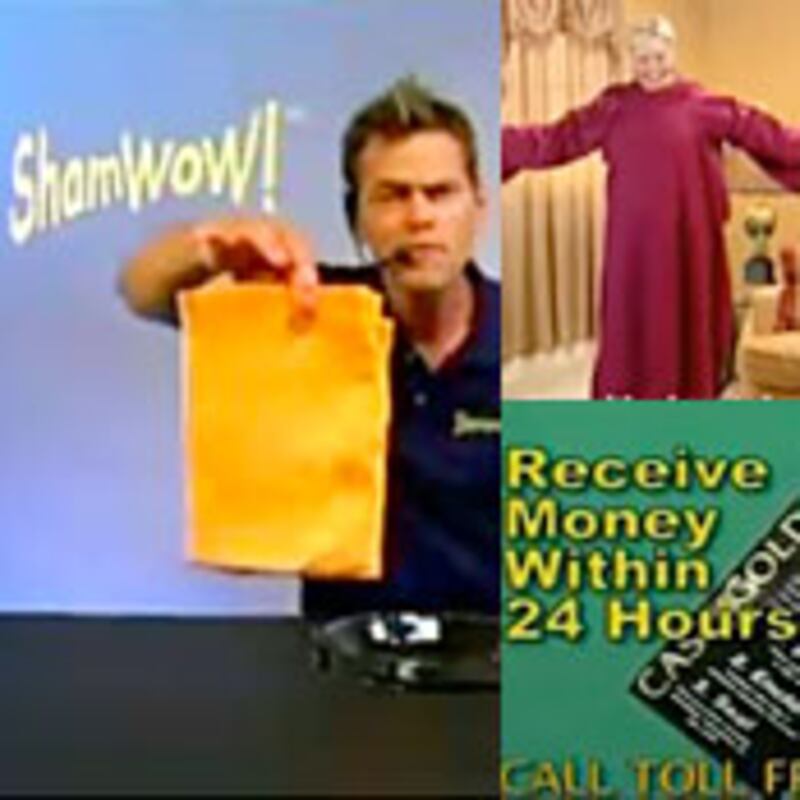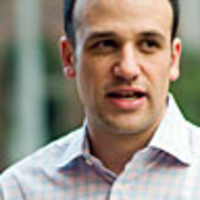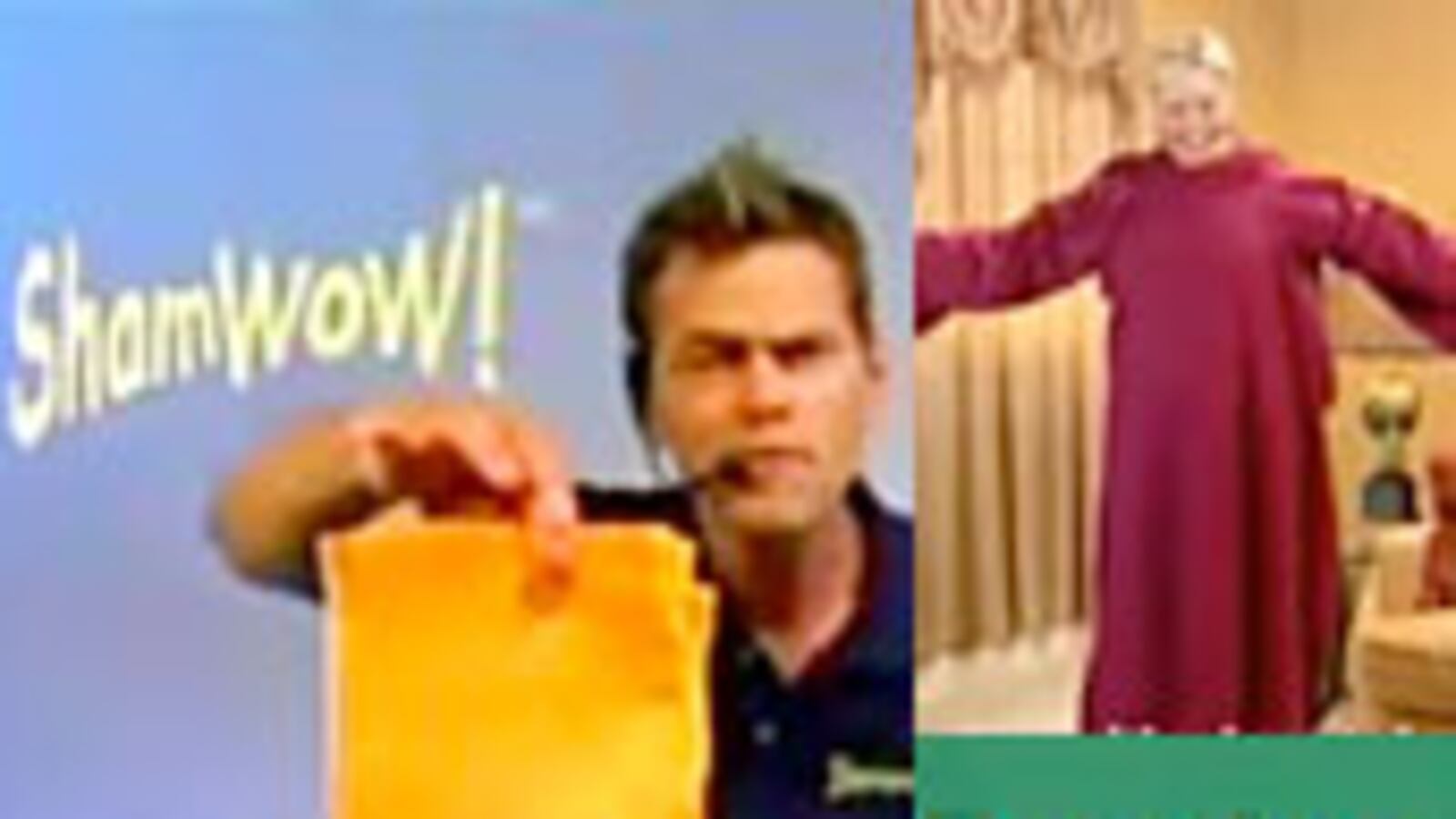
As blue-chip companies crumble and unemployment balloons, it’s boom time for a select few—pawn brokers, repo agents, bankruptcy attorneys, and, perhaps unexpectedly, the guy who sells male enhancement pills at two in the morning.
Falling advertising rates and shrinking marketing budgets at big corporations have created an opening for the $100 billion infomercial industry to reassert its on-air presence in a big way. Turn on the TV tonight and you may see a pitch for a company offering you cash for gold, or an absorbent towel for $19.99 (plus $7.95 shipping and handling, of course.)
The Snuggie's popularity also likely owes a great deal to the economic climate—in the days following the September 11th attacks, sales of down comforters skyrocketed.
Not only is the infomercial industry ascendant—direct spending was up nearly 10 percent through the end of 2008—but their pitchmen are calibrating their spiels to cash in on recession-related anxiety.
One of the most successful products this past winter was the Heat Surge, a small space heater purportedly produced by Amish craftsmen that was touted as a recession-friendly way to heat your house. The Snuggie's popularity also likely owes a great deal to the economic climate—historically, Americans have flocked to such creature comforts during stressful times. In the days following the September 11th attacks, sales of sheets and down comforters skyrocketed, a phenomenon that a leading home shopping host attributed to the public just wanting to be cozy as they lay in bed and watched the horrifying news unfold on TV.
Some companies have pursued a less cozy approach. Cash4Gold made headlines this year after it purchased million-dollar spots during the Super Bowl offering financially strapped Americans money for their jewelry. It didn't take long for the media to pick up on how Cash4Gold could afford such pricey ads: people who call the company's 1-800 number were instructed to mail their gold jewelry to the company's Pompano Beach, Florida headquarters. Cash4Gold offered to deposit the value of the items directly in the customer's bank account. By the time viewers realized that their family heirlooms were being drastically undervalued, Cash4Gold had already melted down the gold and moved on to its next victim.
Monday's New York Times ran a story on real estate pitchman Carleton Sheets, who made a fortune selling no-money-down real estate investments during the housing bubble. But while Sheets represented the boomtime shill who encouraged viewers to indulge their wildest dreams, today’s infomercials feature testimonials from laid-off factory workers who explain—to the same attractive, young women in tight skirts that have always been infomercial decor—how they managed to avoid becoming victims of the downturn by summoning the courage to pick up the phone.
Infomercial marketers seeking to capitalize on current events are not a new phenomenon. The creators of direct response television have always been clever at tying their campaigns to broader cultural trends. In January, for instance, they flood the airwaves with pitches for exercise devices and diet products. And the ubiquitous penile enhancement products didn't become infomercial staples until the country became enamored with pricier pharmaceuticals like Viagra and Cialis.
Sadly, the target market for these products includes some of the most vulnerable, disenfranchised Americans. And the stories can occasionally be heartbreaking. As part of my recent book on the rise of the infomercial industry, I spoke to a 23-year-old California resident—I'll call him Gabriel—who had purchased a real estate "system" called John Beck's Free & Clear. Gabriel wasn't a young kid looking to make a quick buck. A Marine assigned to the 2nd Assault Amphibious Battalion based at Camp Lejeune, he had been gravely injured in Iraq when his tank crossed a downed power line. He was electrocuted and left with second- and third-degree burns and a severe case of post-traumatic stress disorder. He was still recuperating from his injuries—and under the influence of heavy pain medication—when he saw Beck's infomercial promising financial security for life.
Like almost all of the people who buy these sorts of moneymaking kits, Gabriel didn't end up with a gorgeous new home. Under the guise of a "coaching program," which many of these hucksters use to extract more money from their victims, he handed over nearly all the money he'd received after returning home from Iraq—roughly $8,000—based on the promise that if he didn't end up a millionaire by following Beck's system, his money would be returned to him.
Needless to say, the system did not work and Gabriel did not get a refund, an episode he describes as almost as painful as the tour of duty that almost ended his life. I talked to many others who also lost thousands and have yet to see a dime. And there's little doubt the list of victims will grow longer. Get-rich schemes have endured on TV for more than 25 years, and have successfully survived several boom-and-bust cycles. The tantalizing notion that we can become millionaires overnight is appealing in any economy.
There's also little doubt that a handful of Americans, many of whom have had previous run-ins with the authorities, will continue to profit. In addition to the popular ShamWow spokesman who was recently caught up in a prostitution scandal, turn on the TV tonight and you may see Kevin Trudeau hawking a book called Debt Cures They Don't Want You to Know About, which he claims contains the "three magic words" that will convince banks to instantly lower your credit card interest rates. A two-time convicted felon who has been censured by the Federal Trade Commission on more than half a dozen occasions, Trudeau was recently ordered by a federal judge to pay $37 million for his misleading infomercials. But since his empire rakes in as much as $16 million a month by one estimate, even a fine of that magnitude won't necessarily put Trudeau out of business. These multi-million dollar fines are often factored in to the cost of doing business.
Trudeau's latest infomercial features a book called Recession Cures. Not only does he promise to help readers put their troubled finances in order, he says he has a formula to help people "get rich in tough times." Unfortunately, he doesn't share the one get-rich-quick secret that has worked for men like Trudeau for so long: the best way to make millions is to produce an infomercial convincing an unsuspecting public you can make them millions as well.
Remy Stern is the author of But Wait… There's More!, which was published last month by HarperCollins.






